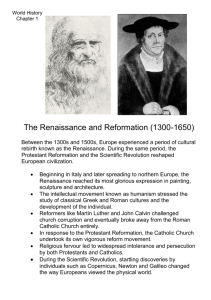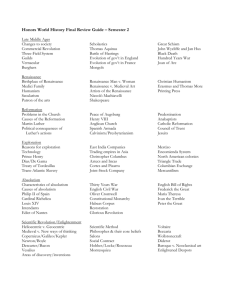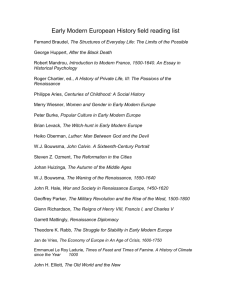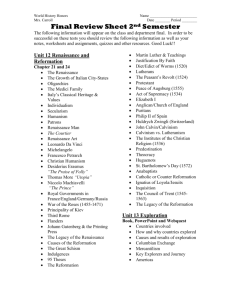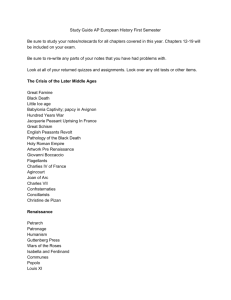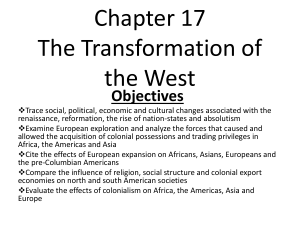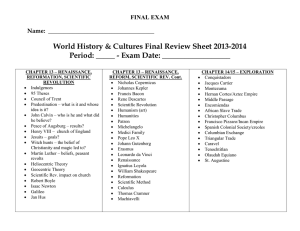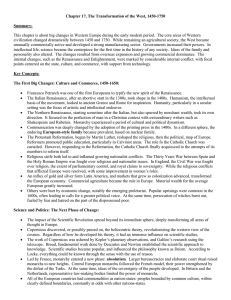Mid-Term Exam Review Sheets
advertisement
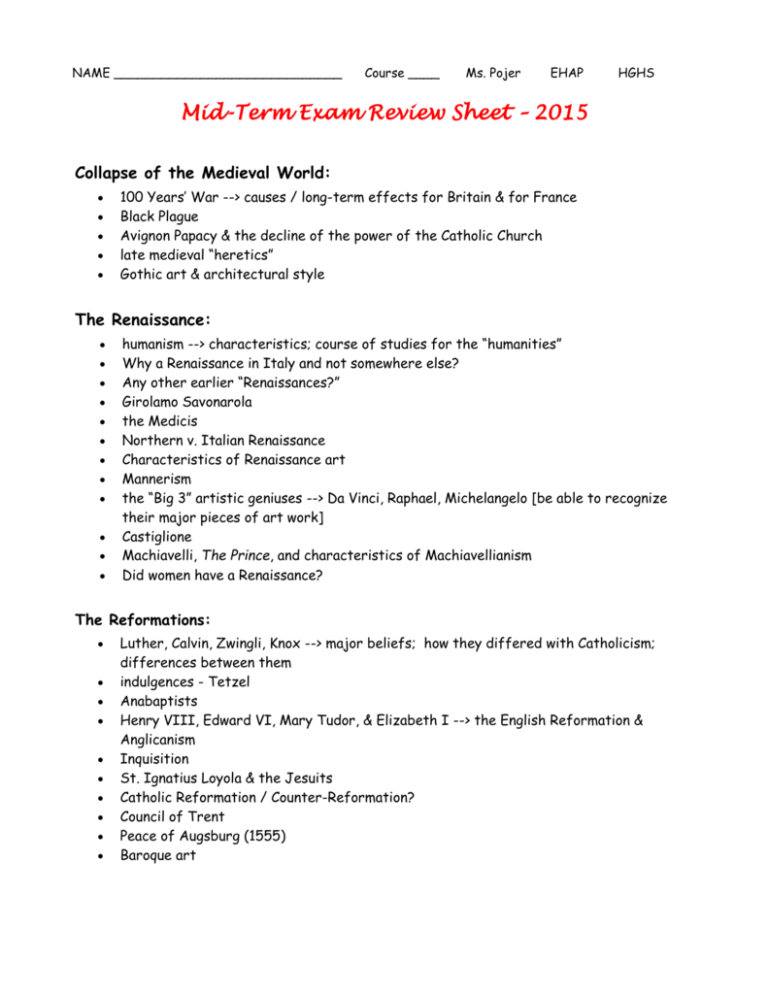
NAME _____________________________ Course ____ Ms. Pojer EHAP HGHS Mid-Term Exam Review Sheet – 2015 Collapse of the Medieval World: 100 Years’ War --> causes / long-term effects for Britain & for France Black Plague Avignon Papacy & the decline of the power of the Catholic Church late medieval “heretics” Gothic art & architectural style The Renaissance: humanism --> characteristics; course of studies for the “humanities” Why a Renaissance in Italy and not somewhere else? Any other earlier “Renaissances?” Girolamo Savonarola the Medicis Northern v. Italian Renaissance Characteristics of Renaissance art Mannerism the “Big 3” artistic geniuses --> Da Vinci, Raphael, Michelangelo [be able to recognize their major pieces of art work] Castiglione Machiavelli, The Prince, and characteristics of Machiavellianism Did women have a Renaissance? The Reformations: Luther, Calvin, Zwingli, Knox --> major beliefs; how they differed with Catholicism; differences between them indulgences - Tetzel Anabaptists Henry VIII, Edward VI, Mary Tudor, & Elizabeth I --> the English Reformation & Anglicanism Inquisition St. Ignatius Loyola & the Jesuits Catholic Reformation / Counter-Reformation? Council of Trent Peace of Augsburg (1555) Baroque art Age of Exploration / Commercial Revolution: Reasons for European exploration & colonization --> Globalization Phase I Columbian Exchange Role of the Portuguese (late 15c – early 16c) Treaty of Tordesillas slavery & the Triangle Trade Price Revolution of the 16c The New Monarchies: Elizabeth I Philip II Wars of Religion: Henry IV (Henry of Navarre) Edict of Nantes (1598) Huguenots politiques Thirty Years’ War (1618-1648) King Gustavus Adolphus (Sweden) Treaty of Westphalia (1648) --> long-term repercussions? (geo-political, religious, economic) Age of Absolutism: Bishop Bousset Thomas Hobbes Divine-Right Monarchy Louis XIV Versailles Cardinal Richelieu intendants Cardinal Mazarin Colbert Peter the Great “Window to the West” Battle of Poltava Poland --> problems with its geo-political position in Europe Austrian Habsburgs Pragmatic Sanction James I Charles I English Civil War Oliver Cromwell & the Puritan Republic English Restoration Glorious Revolution English Bill of Rights (1688-9) the Hanoverians & the beginnings of the Prime Ministership & Cabinet system The Scientific Revolution: Geocentric vs. heliocentric theories Major scientists & their discoveries --> Copernicus, Galileo, Brahe, Kepler, Newton, Harvey, Boyle Deductive [Descartes] vs. inductive [Bacon] reasoning Newtonian view of the universe --> god as the great “Clock-maker” Deism Royal Societies --> their function The Mercantilist World: Mercantilism – characteristics; economic problems Joint-stock company Enclosure movement Entrepreneurship Seven-Years’ War [French & Indian War] --> causes / results for Eng., Fr., India Holland --> carrying trade; main ship-building country British Navigation Acts Adam Smith --> capitalism [characteristics; how it’s different from & critical of mercantilism?] Colbert’s mercantilist policies in France The Enlightenment: philosophes --> know the major individuals & their theories/ideas physiocrat Cesare Beccaria Immanuel Kant salons Diderot & the Encyclopedie General characteristics of the Enlightenment Rococo art enlightened despots --> Catherine the Great, Frederick the Great, Joseph II [what were their policies & how were they “enlightened”? How were they more despotic?] The Ancien Régime: Characteristics of life during this period --> for the upper class, middle class, peasantry, urban poor Proto-industrialization Neo-Classical art Revolutionary France: General causes of the Fr. Revol. --> look at Crane Brinton’s chart [1st 10 elements that are present in a country before a revolution begins] Louis XVI & Marie Antoinette --> how they contributed to the beginning of the Revol. letters de cachet political spectrum chart Declaration of the Rights of Man & of the Citizen Civil Constitution of the Clergy cahiers de doleance Sir Edmund Burke Declaration of the Rights of Woman and of the Female Citizen Mary Wollstonecraft The role of women in the Revolution --> what did they gain? lose? Robespierre’s “Republic of Virtue” --> characteristics Reign of Terror Thermidorian Reaction the Directory--> type of government; weaknesses The Napoleonic Age & Beyond: His vision of France’s role in Europe Concordat of 1801 Code Napoleon Continental System tyrant? republican? revolutionary? Congress of Vienna principles established; major outcomes DBQ the Following Topics: 1. The Renaissance/Reformation 2. Enlightenment thinkers 3. Ancien Régime [pol/eco/soc characteristics] & the French Revolution

